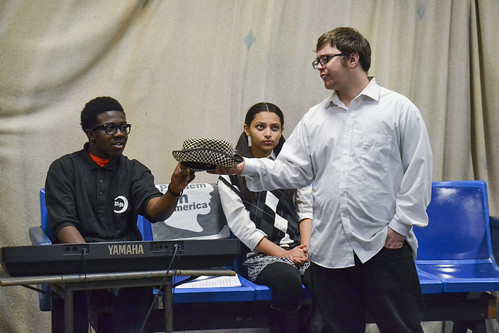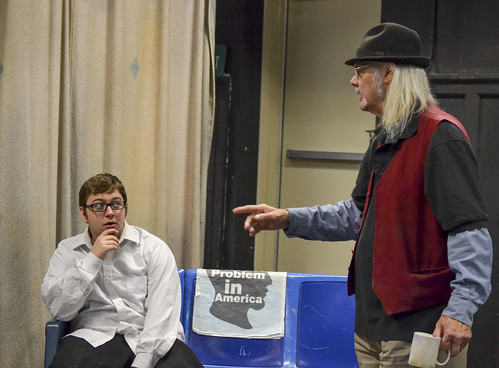The Media Unit highlights age-old issue in ‘From the Back of The Bus’
At 75 years old, Walt Shepperd says he has learned a lot when it comes to the effects of racism. In an interview, he spoke about the impact it can have, the lives it can affect, and how it is still prevalent.
In response, Shepperd, executive producer of a Syracuse-based broadcast and theater production group called The Media Unit, decided to revive a 20-year-old production, “From The Back of The Bus,” which tackles racism head-on.
The play was written in 1996 by a group of teenagers working with The Media Unit, and it will be featured in the production group’s spring tour. Shepperd said the group hopes the play will reach young audiences and help educate them on these issues.
Shepperd founded The Media Unit more than 40 years ago out of the conviction that theater could effectively address issues of race, inequality and social injustice.
Recent killings of young, unarmed black men — Trayvon Martin, Eric Garner and Michael Brown — have received intense, global attention from international news media, leading Shepperd to say he believed his work to be at least as important now as it was when he first started more than 40 years ago.

Throughout his time with The Media Unit, Shepperd has attempted to recruit local youth to star in his productions. He said he tries to feature black and white actors in order to properly showcase and address the issue of racism.
“These are things that confront these young people every day, and they don’t have outlets often, and per- forming is the best way to raise the issues and deal with them,” Shepperd said. “I can’t tell you how many times a teenager will say to me in the school, or the youth center, ‘Wow, it’s really good that you’ve got teenagers telling it to teenagers, and it’s not some adult lecturing at us.’”
“From The Back of The Bus” runs for 45 minutes, and is followed by a 45-minute open dialogue with the audience, focusing on racism and white privilege in America. The critically acclaimed play has received awards from the NAACP, the Human Rights Commission, the Southside Business Association and Urban CNY.

A primary storyline in “From the Back of the Bus” focuses on interactions between two high school students, both applying to colleges. One character named Holden, a white student, claims that affirmative action will inhibit his chances to get into the college of his choice. Instead, he believes another character in the play, an African- American girl named Aquila, will be chosen simply to fill a racial quota at the college.
Aquila believes she has had to work twice as hard due to the color of her skin, and she is worried that more people will start to share Holden’s sentiment that every- thing is handed to her.
Holden is played by Elijah Sheridan, and Aquila is played by Shannon Williams. Despite being only in their teens, Sheridan and Williams said they recognize the importance of the issues they will be addressing through their performances.
“I’m the person that everyone shoots the evil looks at, and to be honest, I love it because it means we’re getting the message across,” Sheridan said. “And that’s really what the point of the whole show is, to get the message across and that this is still a very evident issue in our society.”
Williams said she shares Sheridan’s assessment, saying it’s important to establish a connection with the audience to get their message across, because it’s this generation of youth that will either help end racism, or allow it to continue.
“The more we keep it in darkness, the more it’s going to grow,” Williams said. “If nobody just nips it in the bu d now, it’s going to thrive for years.”
d now, it’s going to thrive for years.”
Shepperd said he has seen racism remain constant throughout his entire career. He said when he first decided to reprise the 20-year-old play, he was worried they would have to re-write a large portion of it. Instead, after reading through the script, he realized they could leave it almost completely intact. This realization came with both pleasant and unpleasant notions.
“We only had to change one line in the entire show,” Shepperd said. “Which is unfortunate because it shows from 1996 – two decades – racism is racism.”
Those within The Media Unit, however, said they believe they can change that. James Patterson, who has worked as the vocal coach with The Media Unit for 12 years and has starred as the lead singer for the local R&B group, The Blacklites, said he believes the unit has already made significant progress — especially in Syracuse. But he said he recognizes more work remains.
“We’d like to think that we have already made a difference,” Patterson said. “But we still have a lot of work to do. It’s just like James Earl Jones said, ‘We’ve come a long way, but we’ve got a long way to go.’”
— Article and photos by Ari Gilberg, The Stand Urban Affairs reporter
 The Stand
The Stand

